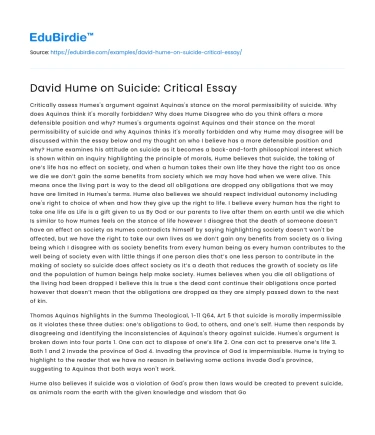Introduction
David Hume, an eminent philosopher of the Enlightenment era, delved into the contentious issue of suicide in his essay "On Suicide." In a period when religious and societal norms predominantly condemned the act, Hume adopted a rational and secular lens to explore its ethical dimensions. This essay critically examines Hume's arguments, emphasizing his challenge to the prevailing moral judgment against suicide. Hume's discourse extends beyond mere permissibility, questioning the individual's right over their own life and the role of divine providence in human affairs. By engaging with Hume's perspective, this essay seeks to unravel the complexities of his reasoning and assess the enduring relevance of his ideas. Through an exploration of his philosophical stance, coupled with counter-arguments, this analysis aims to present a comprehensive understanding of Hume's position on suicide.
Hume's Argument for Autonomy
Hume's central thesis in his essay on suicide pivots around the concept of individual autonomy, a principle that resonates with modern philosophical thought. He posits that individuals possess a natural right to govern their own lives, including the decision to end it. Hume argues that life, akin to any other possession, should be subject to personal discretion. "When we have lost all hope of happiness," he asserts, "when life has become a burden, and we have reason to fear greater ills from continuing, why should we prolong our miseries?" (Hume, 1755). This quote encapsulates his view that the rational evaluation of one's circumstances can justify the cessation of life. Hume's argument challenges the religious conviction that life is a divine gift, thereby inviolable. He contends that if natural laws permit the termination of life through sickness or accidents, then the conscious choice of suicide should not be deemed unnatural. By advocating for the primacy of personal agency, Hume foregrounds a secular morality that prioritizes individual welfare over doctrinal adherence. However, critics argue that Hume's emphasis on autonomy overlooks the potential societal implications of normalizing suicide, such as the impact on families and communities. This counterpoint necessitates a more nuanced understanding of autonomy, one that balances personal rights with societal responsibilities.
Challenging Divine Providence
Another significant aspect of Hume's argument is his critique of the notion of divine providence, a concept deeply ingrained in 18th-century thought. Hume challenges the belief that life is governed by a divine plan, thus making suicide an affront to divine will. He questions, "If providence governs the world by general laws, the intentional act of suicide does not infringe on these laws any more than any other human action" (Hume, 1755). By equating suicide with other actions that might alter one's life course, Hume dismantles the argument that suicide is a unique transgression against divine order. His rationalist approach seeks to demystify the supernatural interpretations of life's events, advocating for a worldview that recognizes human agency as an integral part of natural law. This perspective invites critique from those who argue that Hume's rationalism fails to account for the emotional and spiritual dimensions of human experience. In dismissing the spiritual significance of life, Hume's framework may neglect the existential and moral complexities that accompany the decision to end one's life. Thus, while Hume provides a compelling critique of providential determinism, his argument may benefit from a more holistic consideration of human existence.
Counter-Arguments and Ethical Considerations
To strengthen his thesis, Hume anticipates and addresses potential counter-arguments, particularly those rooted in ethical and social concerns. Critics often argue that viewing suicide through a lens of personal freedom could inadvertently legitimize acts of self-harm and neglect the moral duty to persevere through suffering. Hume counters this by suggesting that moral duties must be evaluated concerning their capacity to deliver happiness and avoid misery. He posits that enduring unbearable suffering without hope of relief undermines the very purpose of moral obligations, which is to enhance human well-being. Furthermore, Hume's critics raise concerns about the potential for societal harm, arguing that normalizing suicide could erode communal bonds and diminish collective responsibility for the vulnerable. Hume, however, maintains that the individual assessment of one's life circumstances should not be unduly constrained by hypothetical societal impacts. By framing the debate in terms of individual versus societal ethics, Hume invites ongoing discourse about the limits of personal freedom in moral decision-making. While his arguments offer robust advocacy for autonomy, they also highlight the need for a balanced ethical framework that considers both personal and collective dimensions of human life.
Conclusion
In conclusion, David Hume's exploration of suicide presents a provocative challenge to conventional moral and religious doctrines. His arguments for individual autonomy and the questioning of divine providence offer a rationalist perspective that continues to resonate in contemporary ethical discussions. Hume's critique of the moral and metaphysical assumptions surrounding suicide underscores the importance of embracing a secular approach to ethical dilemmas. Nonetheless, the enduring relevance of Hume's ideas lies in their capacity to provoke thoughtful debate, encouraging a nuanced exploration of the moral complexities inherent in the issue of suicide. By engaging with both supportive and opposing viewpoints, this essay highlights the multifaceted nature of Hume's philosophy, advocating for a comprehensive understanding of human autonomy and moral responsibility.






 Stuck on your essay?
Stuck on your essay?

